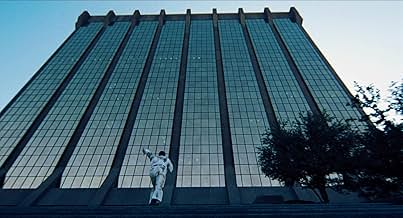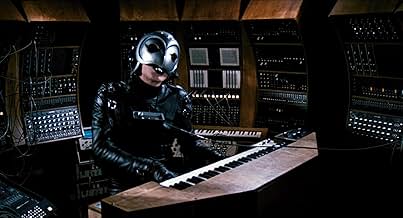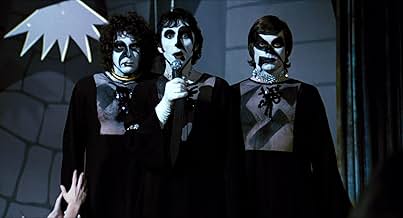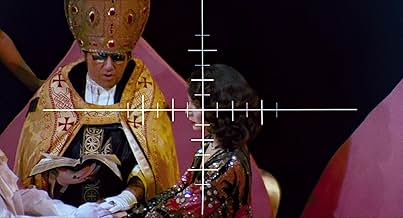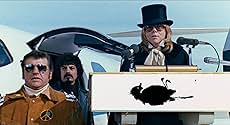Ein entstellter Komponist verkauft seine Seele für die Frau, die er liebt, damit sie seine Musik aufführt.Ein entstellter Komponist verkauft seine Seele für die Frau, die er liebt, damit sie seine Musik aufführt.Ein entstellter Komponist verkauft seine Seele für die Frau, die er liebt, damit sie seine Musik aufführt.
- Regie
- Drehbuch
- Hauptbesetzung
- Für 1 Oscar nominiert
- 3 Gewinne & 5 Nominierungen insgesamt
Peter Elbling
- The Juicy Fruits
- (as Harold Oblong)
- …
Empfohlene Bewertungen
"Phantom of the Paradise" is Brian De Palma's outrageous blend of horror, comedy and rock opera very loosely based on Gaston Leroux's immortal novel "Phantom of the Opera". I know it is hard to think of a musical horror movie without thinking about "The Rocky Horror Picture Show", but De Palma strikes first with this more horror-oriented (although still hysterically funny) satire on the music industry of the 70s.
Swan (Paul Williams) is a powerful and legendary music producer who is making preparations for his greatest triumph in music business: The Paradise, a monster auditorium that will serve him as palace. To inaugurate his palace, he is looking for the perfect sound and he fins it in the music of Winslow Leach (William Finley), a young composer who dreams with presenting his "Faust" cantata to the world. Swan steals Leach's work and in an accident, deforms his face turning Leach into The Phantom. Now, as the masked monster, the Phantom will try to stop Swan's plans by sabotaging the Paradise.
The movie is a visually and musically impressive rock opera with a healthy dose of horror and tongue-in-cheek humor. Brian De Palma cleverly conjures the basic outline of Leroux's novel and add elements of his other influences making the movie a subtle yet moving tribute to the books/movies/music he loves. The modernization and the change from opera to rock work surprisingly good and despite of being a bit outdated by now, the music (by Paul Williams) still makes one of the best soundtracks in a horror film.
De Palma continues improving his technique in this film and like in the previous "Sisters", his style shows maturity and a definitive trademark. Often labeled as a Hitchcock-imitator, I believe that De Palma simply likes to pay constant tribute to his influences, and this film serves a proof of that. Elements of Welles, Hitchcock, Murneau, Whale and Wienne are all over the picture, yet "Phantom of the Paradise" is like none of the works of those directors.
Paul Williams not only composed the soundtrack, he also stars as Swan, the dark and evil genius that leads Death Records and ultimately uses Leach's music for his own purposes. His performance is superb and while not physically imposing he is truly one of the best villains I've ever seen. Finley's take on the Phantom is, like most of the modern interpretations of the character, a romantic tragic figure; but Finley recovers some of the original horror characteristics of the novel creating an attractive but still menacing monster.
Jessica Harper, who would achieve fame in Dario Argento's "Suspiria", gives a good performance as Phoenix, the young singer that captures both Swan and Leach's attention. Like she would do in "Suspiria", she adds depth to the role of the naive singer who wants nothing but to triumph. Something remarkable is the fact that she sang all her songs and did it with credibility and talent. Last but not least, Gerrit Graham portrays a Bowie-inspired Glam rock diva in the unforgettable role of rock superstar Beef.
Sadly, not everything is perfect in Paradise, and neither is in this movie. The odd mixture of musical and horror works very good but at times the movie gets a bit too serious to pass as a musical or too silly to pass as a horror film. It's not a surprise that "The Rocky Horror Picture Show" gained more recognition as it keeps both genres perfectly in equilibrium in all its flamboyant runtime. Still, this is a minor flaw that keeps the movie away from perfection.
Maybe I had low expectations or maybe I was just in the right mood, but "Phantom of the Paradise" was a pleasant surprise that I would not hesitate to recommend to fans of "The Rocky Horror Picture Show" or fans of black comedy in general. 8/10
Swan (Paul Williams) is a powerful and legendary music producer who is making preparations for his greatest triumph in music business: The Paradise, a monster auditorium that will serve him as palace. To inaugurate his palace, he is looking for the perfect sound and he fins it in the music of Winslow Leach (William Finley), a young composer who dreams with presenting his "Faust" cantata to the world. Swan steals Leach's work and in an accident, deforms his face turning Leach into The Phantom. Now, as the masked monster, the Phantom will try to stop Swan's plans by sabotaging the Paradise.
The movie is a visually and musically impressive rock opera with a healthy dose of horror and tongue-in-cheek humor. Brian De Palma cleverly conjures the basic outline of Leroux's novel and add elements of his other influences making the movie a subtle yet moving tribute to the books/movies/music he loves. The modernization and the change from opera to rock work surprisingly good and despite of being a bit outdated by now, the music (by Paul Williams) still makes one of the best soundtracks in a horror film.
De Palma continues improving his technique in this film and like in the previous "Sisters", his style shows maturity and a definitive trademark. Often labeled as a Hitchcock-imitator, I believe that De Palma simply likes to pay constant tribute to his influences, and this film serves a proof of that. Elements of Welles, Hitchcock, Murneau, Whale and Wienne are all over the picture, yet "Phantom of the Paradise" is like none of the works of those directors.
Paul Williams not only composed the soundtrack, he also stars as Swan, the dark and evil genius that leads Death Records and ultimately uses Leach's music for his own purposes. His performance is superb and while not physically imposing he is truly one of the best villains I've ever seen. Finley's take on the Phantom is, like most of the modern interpretations of the character, a romantic tragic figure; but Finley recovers some of the original horror characteristics of the novel creating an attractive but still menacing monster.
Jessica Harper, who would achieve fame in Dario Argento's "Suspiria", gives a good performance as Phoenix, the young singer that captures both Swan and Leach's attention. Like she would do in "Suspiria", she adds depth to the role of the naive singer who wants nothing but to triumph. Something remarkable is the fact that she sang all her songs and did it with credibility and talent. Last but not least, Gerrit Graham portrays a Bowie-inspired Glam rock diva in the unforgettable role of rock superstar Beef.
Sadly, not everything is perfect in Paradise, and neither is in this movie. The odd mixture of musical and horror works very good but at times the movie gets a bit too serious to pass as a musical or too silly to pass as a horror film. It's not a surprise that "The Rocky Horror Picture Show" gained more recognition as it keeps both genres perfectly in equilibrium in all its flamboyant runtime. Still, this is a minor flaw that keeps the movie away from perfection.
Maybe I had low expectations or maybe I was just in the right mood, but "Phantom of the Paradise" was a pleasant surprise that I would not hesitate to recommend to fans of "The Rocky Horror Picture Show" or fans of black comedy in general. 8/10
Still playing on double-bills with The Rocky Horror Picture Show in England, Brian DePalma's foray into the psychodelic world of the musical excesses that was the 70's becomes more than just another rock musical. With a fusion of Faust, Dorian Grey, Phantom of the Opera, the Twilight Zone (courtesy of an opening narration by Rod Serling)and Psycho, using multiple camera angles cleaved into split screens, we follow the tragic trials and tribulations of one Winslow Leech (William Findley, the scary side splitting surgeon of DePalma's "Sisters"), composer, whose music is stolen by mook henchman Philbin (George Memmoli, Joey Clams of Scorsese's "Mean Streets")on the orders of his boss, rock impresario Swan (song writer Paul Williams, in a role that must have had him giddy) to be used in the opening of his new rock palace, The Paradise.
Attempting to get his music back, Winslow befriends a young, up and coming singer called Phoenix (Jessica Harper, who many have accused of being woefully miscast. Watch for her in "My Favorite Year"). Beaten by Philbin, set up on drug charges by Swan, subjected to stainless steel dentures because of Swan's own campaign to wipe out dental decay in the penal system, Leech escapes prison upon hearing his music on the radio, breaks into the record factory, and when caught, accidentally has his faced mauled by a hot record press, and sent moaning in pain into the East River.
Swan continues his preps for the opening, using his former 50's doo-wop group, the Juicy Fruits, now a surfer band called The Beach Bums (Later, they become a Kiss-like bunch called The Undead. The band is made up of the same three actors, Archie Hahn, Jeffery Commanor and Harold Oblong. Watch for Hahn in many more films, including "Innerspace" as the deadly deliveryman), to perform Winslow's music. A shadowy figure, donning a leather bodysuit, lame lined cape and a hawk-like mask invades the Paradise and starts reeking havoc.
From here, all the cliches play out from Phantom of the Opera, but in one absolutely looney twist is the addition of a fay glitter rock star called Beef (Gerrit Graham, singing voice by Ray Kennedy), who delivers a Hitchcock homage that will never let you look at Janet Leigh in the Bates Motel shower the same way ever again. Toss in a bit of Dorian Grey, with a videotape instead of a portrait taking on the years(and we wonder about Dick Clark's never aging profile!), a strange transformation of several musical themes, all familiar but somehow morphed into different personnas, and you have a cult classic on your hands.
This movie fits into so many different viewer interest groups. First, the DePalma fans, watching his early work before classics like "Sisters", "Carrie" and "Dressed To Kill"; for musicians/soundtrack fanatics, the mutation of a handful of themes into different works, as well as an incidental soundtrack filled with string quartets, classic piano and organ; for movie trivia fans, the appearance of the star of one of DePalma's all time suspense/horror classics as a production associate, not as an actress (I'm not telling you. watch the credits!).
For the rest of us, a great popcorn night movie that will leave you laughing, tapping your feet and wondering "Where was I when this movie came out and how did I miss it the first time?"
Attempting to get his music back, Winslow befriends a young, up and coming singer called Phoenix (Jessica Harper, who many have accused of being woefully miscast. Watch for her in "My Favorite Year"). Beaten by Philbin, set up on drug charges by Swan, subjected to stainless steel dentures because of Swan's own campaign to wipe out dental decay in the penal system, Leech escapes prison upon hearing his music on the radio, breaks into the record factory, and when caught, accidentally has his faced mauled by a hot record press, and sent moaning in pain into the East River.
Swan continues his preps for the opening, using his former 50's doo-wop group, the Juicy Fruits, now a surfer band called The Beach Bums (Later, they become a Kiss-like bunch called The Undead. The band is made up of the same three actors, Archie Hahn, Jeffery Commanor and Harold Oblong. Watch for Hahn in many more films, including "Innerspace" as the deadly deliveryman), to perform Winslow's music. A shadowy figure, donning a leather bodysuit, lame lined cape and a hawk-like mask invades the Paradise and starts reeking havoc.
From here, all the cliches play out from Phantom of the Opera, but in one absolutely looney twist is the addition of a fay glitter rock star called Beef (Gerrit Graham, singing voice by Ray Kennedy), who delivers a Hitchcock homage that will never let you look at Janet Leigh in the Bates Motel shower the same way ever again. Toss in a bit of Dorian Grey, with a videotape instead of a portrait taking on the years(and we wonder about Dick Clark's never aging profile!), a strange transformation of several musical themes, all familiar but somehow morphed into different personnas, and you have a cult classic on your hands.
This movie fits into so many different viewer interest groups. First, the DePalma fans, watching his early work before classics like "Sisters", "Carrie" and "Dressed To Kill"; for musicians/soundtrack fanatics, the mutation of a handful of themes into different works, as well as an incidental soundtrack filled with string quartets, classic piano and organ; for movie trivia fans, the appearance of the star of one of DePalma's all time suspense/horror classics as a production associate, not as an actress (I'm not telling you. watch the credits!).
For the rest of us, a great popcorn night movie that will leave you laughing, tapping your feet and wondering "Where was I when this movie came out and how did I miss it the first time?"
Talented underground creators. How great it is to be in their worlds! that's when we get them at the height of their more uncontrolled and pure creativity. unmanipulated, wild. The outcome of what they do when they work within the underground is hardly the best work they produce, but it's often their more passionate creations, and practically always indicates what they will master when they "grow up".
Here we have a film that exists in 3 levels (at least 3 that matter to me):
The story matters only for the fact that we have a battle between creative and money grower, something that all the people involved here might know pretty well back in those days.
Jennifer Harper has a pretty face, and illuminates the set when she sings.
My opinion: 4/5
http://www.7eyes.wordpress.com
Here we have a film that exists in 3 levels (at least 3 that matter to me):
- this is a film within a social and cultural context. The kind of music we hear here (not the multiple parodies, but the music that is intended to be "good") was a reaction to the 60', or the next step of the evolution. Within the same underground spirit that created this film, there was a growing tendency to extend and invent forms that would accommodate the fantasies of new musicians. That's what today we know as progressive rock. This film would pave the way for Tommy, for Live at Pompei, and for The Wall.
- Paul Williams, great mind, great talent. Much of what works here is his vision, from the mood even to some roots of the story. His parodies are great, but his real stuff is good enough. I enjoyed getting to know him better, and it Is funny that he comes to perform the guy who steals his own music.
- de Palma, who was my first interest when coming to this. The fact is i didn't know so well what to expect, and i ended up appreciating more the other levels than this one of the director. Apparently by this time he had clarified what he wanted to explore, but he was far from mastering any of his enormous visual skills, or this film was such a collective work that he just couldn't make his personal statement so well. Anyway we have here eventually the first split screen of his career (i'm not absolutely sure of this), something he would take all his careers with incredible results. Other than that, we don'te have his magical camera eye yet.
The story matters only for the fact that we have a battle between creative and money grower, something that all the people involved here might know pretty well back in those days.
Jennifer Harper has a pretty face, and illuminates the set when she sings.
My opinion: 4/5
http://www.7eyes.wordpress.com
A composer has his music stolen by a big-time record producer and vows his revenge. Things get more complicated after he gets sent to jail and apparently commits suicide in the river...
Howard Maxford feels the film is "dated", and that is the best criticism one can make of the film. The songs do not hold one's attention well. The plot in general is decent, but the music -- a central focus of the movie -- is just average.
Brian de Palma, the director of "Carrie" and "Black Dahlia", is in charge here. He makes a visually appealing film, with angles and colors that call to mind Stanley Kubrick's "2001" and "A Clockwork Orange", as well as Dario Argento's "Suspiria" (which star Jessica Harper would appear in after this film).
Gerrit Graham ("TerrorVision") as Beef is great, and a nice send-up of glam rock. The critics had called the film "funny" and "hilarious", but both are exaggerations. The humor is very subtle, with this being a musical first, horror film second and comedy third.
The references to Dorian Gray are awesome, and unspoken. There are also cues from Poe and previous "Phantom" films. Some have said there is even an homage to Orson Welles' "Touch of Evil" (and I believe them, but I have not seen the film yet). Sissy Spacek is credited as a "set dresser"... you decide what that means.
Howard Maxford feels the film is "dated", and that is the best criticism one can make of the film. The songs do not hold one's attention well. The plot in general is decent, but the music -- a central focus of the movie -- is just average.
Brian de Palma, the director of "Carrie" and "Black Dahlia", is in charge here. He makes a visually appealing film, with angles and colors that call to mind Stanley Kubrick's "2001" and "A Clockwork Orange", as well as Dario Argento's "Suspiria" (which star Jessica Harper would appear in after this film).
Gerrit Graham ("TerrorVision") as Beef is great, and a nice send-up of glam rock. The critics had called the film "funny" and "hilarious", but both are exaggerations. The humor is very subtle, with this being a musical first, horror film second and comedy third.
The references to Dorian Gray are awesome, and unspoken. There are also cues from Poe and previous "Phantom" films. Some have said there is even an homage to Orson Welles' "Touch of Evil" (and I believe them, but I have not seen the film yet). Sissy Spacek is credited as a "set dresser"... you decide what that means.
This is an absurd and wildly entertaining glam-rock twist on the "Phantom of the Opera" story. Winslow Leach has his rock opera stolen by music biz icon Swan. After terrorizing the record company, Leach is in an awful (but rather hilarious!) accident that renders him disfigured. He terrorizes the opening night of Swan's new rock'n'roll palace, The Paradise.
This is the best horror film I've seen by De Palma. While it is mostly tongue-in-cheek, it does feature one of the most suspenseful uses of his trademark "split screen." The story is great--a surprisingly clever indictment of the music industry. The music is wonderful if you like glam, though the songs that Jessica Harper (the Christine figure) sings seem out of place and are about as deadpan as her performance. Gerrit Graham is a riot as Beef and steals every scene he is in. I recommend "Phantom of the Paradise" to fans of over-the-top productions such as Rocky Horror, as well as anyone looking for a unique twist on a classic tale that doesn't take itself too seriously. My Rating: 7.5/10
This is the best horror film I've seen by De Palma. While it is mostly tongue-in-cheek, it does feature one of the most suspenseful uses of his trademark "split screen." The story is great--a surprisingly clever indictment of the music industry. The music is wonderful if you like glam, though the songs that Jessica Harper (the Christine figure) sings seem out of place and are about as deadpan as her performance. Gerrit Graham is a riot as Beef and steals every scene he is in. I recommend "Phantom of the Paradise" to fans of over-the-top productions such as Rocky Horror, as well as anyone looking for a unique twist on a classic tale that doesn't take itself too seriously. My Rating: 7.5/10
Wusstest du schon
- WissenswertesThe record press in which the character Winslow Leach is disfigured was in fact a real pressing plant (it was an injection-molding press at an Ideal Toy Company plant). William Finley was worried about whether the machine would be safe, and the crew assured him it was. The press was fitted with foam pads (which resemble the casting molds in the press) and there were chocks put in the center to stop it from closing completely. However, the machine was powerful enough to crush the chocks that it gradually kept closing. It is commonly believed that Finley pulled his head out of the press just in time to avoid being injured, and that his scream in that scene was genuine, but this is an exaggeration. Finley was quickly pulled out by grips and the record press scene, along with most scenes in the movie with little dialogue, was filmed without sound, and the talking and sound effects were dubbed in later. At a Phantom of the Paradise convention, Finley exaggerated the story and said that his scream was "for real", although he may have meant that he was able to conjure up a very real scream in post-production by thinking back to his memories of the incident.
- PatzerVideotape was still only in the experimental development phase in 1953, when Swan records his suicide note/contract, and at that it was only capable of black and white images. Color, broadcast quality videotape of the kind depicted here was not available until the late 1950s.
- Zitate
The Phantom: [to Beef] Never sing my music again. Not here, not anywhere. Do you understand? Never again. My music is for Phoenix. Only she can sing it. Anyone else who tries, dies!
- Crazy CreditsThe closing credits feature a series of montages of the cast members, identifying each by name, starting with the musical trio (Oblong, Hahn, Comanor) and concluding with William Finley as Winslow/The Phantom. These montages are made up of shots ostensibly from the movie, and most of them are, but there are also numerous outtakes.
- Alternative VersionenIn the pre-release (or press) prints of the movie, the scene where Winslow was disfigured by the record press was longer; His disfigured face was briefly seen steaming with smoke from the press, and Winslow then killed the cop that surprised him (and shot him in the leg, which explained why Winslow walked with a limp for most of the film; however, he was able to run with the greatest of ease towards the end). The scene was removed from subsequent versions, as it was best decided that Winslow's disfigured visage be revealed at the end of the film.
- VerbindungenFeatured in Terror im Parkett (1984)
- SoundtracksGoodbye, Eddie, Goodbye
Written by Paul Williams
Performed by Jeffrey Comanor, Archie Hahn and Peter Elbling as The Juicy Fruits, lead vocal Archie Hahn
Top-Auswahl
Melde dich zum Bewerten an und greife auf die Watchlist für personalisierte Empfehlungen zu.
- How long is Phantom of the Paradise?Powered by Alexa
Details
- Erscheinungsdatum
- Herkunftsland
- Sprache
- Auch bekannt als
- Un fantasma en el paraíso
- Drehorte
- Produktionsfirmen
- Weitere beteiligte Unternehmen bei IMDbPro anzeigen
Box Office
- Budget
- 1.300.000 $ (geschätzt)
- Weltweiter Bruttoertrag
- 2.245 $
- Laufzeit1 Stunde 31 Minuten
- Farbe
- Seitenverhältnis
- 1.85 : 1
Zu dieser Seite beitragen
Bearbeitung vorschlagen oder fehlenden Inhalt hinzufügen



